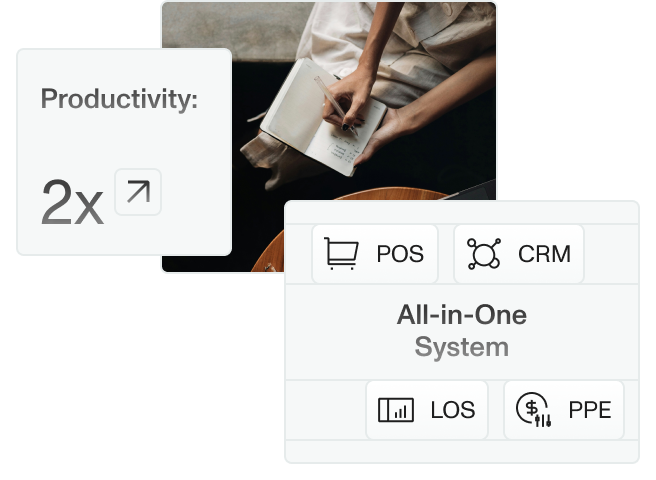In the loan origination business, success or failure can come down to a keen understanding of people, not just numbers and data. Loan originators looking to separate themselves from their competitors are best positioned when they understand the intricacies of buyer psychology. Understanding what influences borrowers’ decisions allows loan originators to tailor their strategies to better meet client needs. In doing so, you’ll build your brand, and grow your business by generating more leads and closing more deals.
Understanding buyer psychology isn’t a “nice to have,” it’s a need-to-have from the standpoint that the fundamental part of being an effective loan officer requires savvy lead generation techniques. When loan officers relate to the emotional and cognitive processes that influence their clients’ decisions, it can provide an intangible human element that develops trust in addition to their expertise. The double threat of these skill sets will lead to loan approvals, higher client satisfaction, and reputation for being the go-to loan origination provider in your market.
Psychological Factors in Loan Decisions
So, what are some of the psychological factors that are a common denominator amongst potential borrowers? For experienced loan origination officers, you may have a sense of what these are based on the numerous interactions you’ve had with potential customers over the years.
Trust: The Bedrock of Business Relationships
Trust is important in any successful relationship, and the loan origination process is no exception. You’re dealing with one of the biggest investments most people will make, so to that end, borrowers need to feel confident that their loan officer is acting in their best interest. Trust is earned, not given, and sometimes that takes some time to build. Take the necessary time to build trust through consistent and direct communication, transparency, and a genuine desire to see the best outcome for your client(s).
Example: After an introductory consultation, and after perhaps reviewing the borrower’s portfolio, be honest with them about potential challenges based on their personal circumstances. Oftentimes, people need to hear the reality of their situation, not a feel good story. It will go a long way in helping them understand what is achievable for them, and sets them down a right path. This type of honesty can lead to repeat business down the road.
Perceived Value: Understanding How Borrowers Evaluate Loan Options
Borrowers often evaluate loan options based on perceived value rather than just the raw numbers or a gut feeling. Perceived value includes the overall benefits they believe they will receive from the loan, such as lower interest rates, favorable terms, and the reputation of the lending institution.
Example: A loan officer who can clearly articulate how a particular loan product meets a client’s unique needs can significantly influence the client’s decision. Furthermore, giving different options with different interest rates and loan terms they qualify for can let them explore the spectrum of options available to them. Equipping potential borrowers with the context of their options allows them to make an informed decision, which will make them feel like you went the extra mile for them.
Emotional Considerations: We’re All Human, After All
Emotions play a powerful role in decision-making; anxiety, excitement, uncertainty – are all emotions a buyer might feel – especially if they are buying their first home!
Loan officers who can tap into these emotional triggers in a genuine and non-manipulative way will find that their clients feel they have guided them towards a right decision without exacerbating any negative emotions they might be feeling while reinforcing the positive ones. Don’t be afraid to ask or inquire about future goals, dreams, and fears, and show them you listened by outlining how you considered those feelings in their loan journey.
Example: Reinforcing the age-old adage of real estate being one of the best long-term investments can help quell the fear of short-term concerns over cash flow and spending a lot of money on a down payment. Remind them that they are going about the process right, putting in the required work, and deserve to feel excited, and not nervous, about this leap they’re taking.
Testimonials and Referrals on Buyer Behavior
Even in the world of digital marketing, testimonials and word-of-mouth referrals from satisfied clients can be the final influence for another borrower to seek your service. That vicarious feeling of seeing peers, colleagues, and friends having a positive experience with you can lead to feelings of confidence to move forward in the same direction.
Example: Taking the time to interview former customers about their positive experience and sharing that insight on social media and on your website can help reinforce a growing confidence from other potential borrowers.
Curating Communication for a Personalized Experience
Direct and curated communication can be a game-changer for successful loan originators. People have varied communication preferences and styles. A loan officer who picks up on that and quickly curates their behavior to meet various preferences will find potential borrowers from many different walks of life responding similarly positively to this method.
Building Credibility
We’ve discussed trust earlier in this article, but a key sibling of trust is credibility. Loan officers must position themselves as trusted advisors who are genuinely interested in helping clients achieve their financial goals.
Consistent Check-Ins
Maintaining communication through regular follow-ups is another key strategy, especially in the volatile loan origination space. Have interest rates changed? Did you think of a new strategy for their loan? Checking in with clients at various stages and giving them your latest insights shows that you’re attentive and committed to their success and education. It makes the customer feel that you have their best interest in mind, and aren’t just trying to close the deal as quickly as possible.
Responding to Buyer Behaviors
It’s not just about responding quickly, but correctly. Remembering the emotional spectrum a potential buyer may be on at any time can help you recognize when a specific type of response is appropriate, such as:
- Do they sound like they’re in a hurry? Does this conversation need to be brief?
- Are they looking for encouragement or reinforcement?
- Are they confused and unsure how to ask a certain type of question? Do I need to take additional time to explain a more confusing part of the loan buying process?
Picking up on these cues can help create a feeling in the customer that you’re an active listener, and responding to emotional signs of needing to be talked to in a certain way. Mastering this art is one of the pivotal aspects of the psychological instincts loan officers need.
Let’s go over a few common ones.
Utilizing Psychological Insights and Instincts for Sales Success
At the end of the day, you’re running a business, so landing the sale is crucial. However, it doesn’t have to come at the hands of a toxic or fractured process. Psychological principles can be powerful when applied correctly, growing sales and increasing the amount of loans executed.
Strategic Messaging and Positioning
All of these principles that apply to how you’re communicating with someone one-on-one can apply to your digital footprint as well. Whether it’s your website, social media, or YouTube channel, using psychological insights to craft persuasive messages make a huge impact. Speak from a place of solutions, not problems, and that your expertise can help guide people to the place they want to be – getting handed the keys to their dream home!
Fostering Long-Term Relationships
If you’re dealing with a younger or first-time home buyer, this may be your chance to get a customer for life! Maintaining a long-term approach with clients can lead to repeat business, whether that’s in a refinance, a second home, or a sale and purchase of a new home. Loan officers who prioritize exceptional customer service, education, and build trust and credibility in the process can expect a loyal client base.
Maintaining Ongoing Engagement
If you are able to close with a customer, great job! But, that doesn’t mean you should go your separate ways. Encourage them to join your newsletter, subscribe to your YouTube channel, or follow your social media channels. If you offer ongoing education, that can be incredibly valuable to a new homeowner who wants to keep learning about the real estate and loan origination market.
Resources for Understanding Buyer Psychology
Are you sold on the importance of the psychological component in the loan origination process? If you’re looking to apply buyer psychology to your work, there are several tools and resources available. CRM systems, like Sonar’s, can make a robust process feel streamlined with our integrated LOS, POS, and PPE platform. What has traditionally been a robust and tedious process can be done a lot more simply, and digitally, with Sonar. More home buyers will expect this type of process down the road, so don’t wait, and make the transition now.








